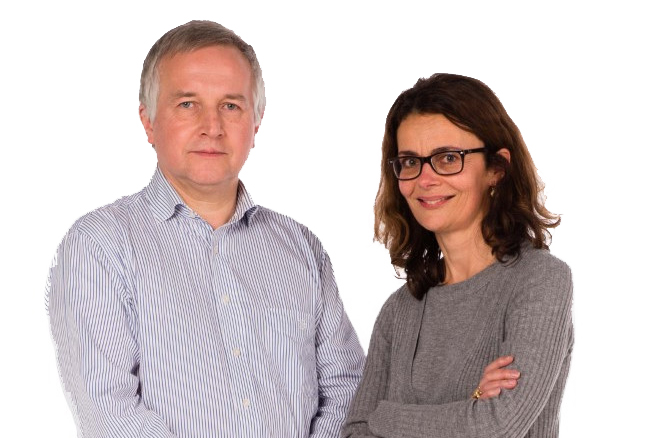Science is often divided into fundamental studies and translational research. This story, from the de Duve Institute at UCLouvain, goes to show that the divide is not as great as we might think it to be. When WELBIO investigators Maria Veiga-da-Cunha and Emile Van Schaftingen discovered the underlying cause of two rare genetic disorders last year, they immediately realized that the implications were huge. The diseases (known as glycogen storage disease type Ib and G6PC3-deficiency) both involved neutropenia: an abnormally low concentration of neutrophils in the blood.
Neutrophils, a type of white blood cells, usually serve as the body’s primary defense against infections by destroying bacteria and viruses. The immune system of a person with neutropenia is therefore greatly weakened. This means that patients often suffer from a higher rate of infections, such as ulcers and abscesses, and chronic Crohn’s disease – like inflammation and wound closure. Although the condition is not deadly in itself, it has an enormous impact on the patient’s quality of life and can lead to lethal infections.
The basic breakthrough
For many years, it was known that the two diseases studied by the Veiga-da-Cunha and Van Schaftingen team were caused by a genetic defect resulting in neutropenia. However, why the neutropenia was actually occurring remained unresolved for decades. What the WELBIO team found last year, was that these patient’s neutrophils were being poisoned by the derivative of a glucose-like molecule (1-deoxyglucose) that we all have in our blood.
This is a perfect illustration of the importance of fundamental research, because it enables us to increase our knowledge and basic understanding of how things work. – Emile Van Schaftingen.
The discovery, published in PNAS, was important for two reasons: it elucidated the disease pathway and provided the academics with a clue on how the disease might be treated. The genetic defect present in these patients meant that 1-deoxyglucose-6-phosphate, the toxic intracellular derivative of 1-deoxyglucose, was accumulating in neutrophils and profoundly disturbing their metabolism. This meant that there was potentially a very simple solution to the problem: the team realized that they may be able to use a common anti-diabetic drug to lower the concentration of 1-deoxyglucose in the blood.
“This is a perfect illustration of the importance of fundamental research,” says Van Schaftingen, “Because it enables us to increase our knowledge and basic understanding of how things work. Something which is vital when it comes to understanding diseases and finding ways to overcome them.”
Astounding results
In a rare turn of events for researchers more used to working with mice, the treatment was approved for testing in humans. The trial started immediately, with the UCLouvain team in collaboration with clinicians from Austria, the United States and the Netherlands, examining how this revolutionary treatment would work in patients. The study used empagliflozin, a common anti-diabetic drug normally prescribed for type II diabetes, and was purely academic without support from any pharmaceutical companies. Van Schaftingen explained:
“It’s particularly nice for these patients, because no pharmaceutical company would ever develop a treatment for them because these are such rare diseases. And here we had a drug that was already tested and in use, that we have been able to repurpose to help people.”
When we started doing this research, we had no idea where we were going to end up. It was really a basic research question, but it led us to helping patients directly. – Maria Veiga-da-Cunha.
The initial results have been a huge success. The patients taking part in the study had been struggling with their condition for a lifetime. Their symptoms included recurrent infections, including skin problems, mouth ulcers and intestinal inflammation, the latter two making it impossible for some of them to eat normally. The administration of the anti-diabetic drug made these symptoms practically disappear within a few weeks. The number of neutrophils in the blood stabilised and, most importantly, neutrophils regained their ability to attack bacteria effectively. Veiga-da-Cunha elaborated:
“The treatment has had a big impact on all the patients we have treated so far. One of our patients, a girl in her early twenties, had suffered from chronic inflammatory bowel disease. They even had to operate on her to remove a portion of her intestine, because it was so inflamed. This treatment has essentially eliminated her issues; she’s now living a much more normal life and has functioning neutrophils that are allowing her body to fight off infection.”
The importance of fundamental research
This simple and elegant solution has the potential to radically improve the lives of such patients. Many patients are now being treated around the world based on discoveries made by the de Duve Institute team. The research was made possible thanks to FNRS, UCLouvain, the de Duve Institute and particularly WELBIO, who jointly funded the study.
Read this previous BioVox article for another example of fundamental research saving lives.
This story goes to show the immense importance of fundamental research in providing the building blocks for future medical interventions. Though there may not be much monetary profit in basic research itself, such studies are invaluable to human health.
“When we started doing this research,” Veiga-da-Cunha concluded, “We had no idea where we were going to end up. It was really a basic research question, but it led us to helping patients directly. Fundamental research is important like that. We ask an interesting question, and perhaps the answer will help a patient or perhaps it won’t. But in the end, you will always have increased our knowledge.”


